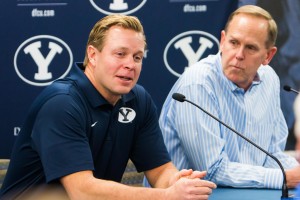
Reporters asked BYU Athletic Director Tom Holmoe at the departing news conference for Bronco Mendenhall if BYU could pay “market value” money to the new coach. Some believe the BYU head coach is underpaid.
Holmoe responded by saying Power Five conference money wasn’t an option, but BYU would still pay a competitive price. Bronco Mendenhall, now the new head coach at the University of Virginia, added his opinion.
“Part of coaching at BYU is what you gain through the experiences,” Mendenhall said in the news conference. “If (money is) what you end up being hung up on you will not be effective here for very long. That just has to be understood because there’s plenty of other things that add value here besides that and it takes a pretty unique perspective to gain that.”
Estimates for Mendenhall’s BYU salary, not publicly released, range from $900,000 to $2 million. According to a USA Today analysis, if Mendenhall’s salary were compared to the salaries of the 64 coaches in the Power Five conferences, he would finish at No. 62, only edging out Illinois ($916,000) and Kansas ($801,169).
The University of Virginia will be paying Mendenhall $3.25 million a year, still a far cry from coaches like Alabama coach Nick Saban and Michigan coach Jim Harbaugh, who make more than any college coach at $7.1 million and $7 million respectively.[Best_Wordpress_Gallery id=”339″ gal_title=”Football Coaches Salaries”]
Despite the comparatively low salary at BYU, players and coaches say there is more to coaching at BYU and that those experiences make up the difference in pay. Those experiences are the Honor Code and the atmosphere it creates for players of all religions and cultures as well as the opportunity to represent the LDS Church, which owns and operates BYU.
Many teams have rules players must live by, but at BYU, players — like all students — must live the Honor Code because of the university’s church affiliation. This means students live a moral lifestyle and refrain from drugs, alcohol and coffee. Current associate athletic director of development and former Cougar tight end Chad Lewis views the Honor Code as an advantage and strength for BYU and as a competitive advantage for the Cougars.
“The Honor Code is what gives BYU something different than any other place in the world. The Honor Code and what BYU stands for helps every coach and every player live up to our full potential,” Lewis said. “Not one person here is perfect, but every one of us is trying to be better and that is the intent of the Honor Code. It’s not the Gestapo. It’s not the police. It’s a marker of BYU which helps us reach higher.”
Mendenhall was a coach who whole-heartedly embraced the Honor Code and the vision of the university. This could be one of the reasons that he ended a three-year losing streak and led BYU to a winning record and bowl game in each of his 11 seasons as head coach.
The Honor Code sets BYU apart from most universities, but it is also draws players and students to BYU.
“This environment is unbelievable. I’ve played in college, I’ve played in the pros, I’ve been in Pro Bowls, and I testify that this environment is unique and incredible, and it was one of the things that I loved most about playing at BYU,” Lewis said.
Lewis said one reason players come to BYU is because it is clean and a great place to play football. During Lewis’ senior year, the team was a melting pot of different religions and cultures. But it didn’t matter what religion they were, they were a team that was willing to fight for each other and eager to play in the unique atmosphere offered by BYU.
“The environment at BYU, to play how we play, to talk about religion, to have a clean environment to play football, an environment that the coaches support, the administration supports, the board of trustees supports, the fans support, it’s unbelievable,” Lewis said. “There’s so much strength in that.”
Cougar fans across the country represent one of the best fan bases in college sports. They love to support the team and see its success. Mendenhall was a coach who knew the impact of BYU’s success on the players, team, university and fans.
“I want the players to have success, and I want the institution to have success, and I want that because of what it does for the faith, specifically the LDS faith,” Mendenhall said in the news conference.
BYU football players and its coach have a unique role as ambassadors for both the school and BYU’s church sponsor.
“The whole country can get a glimpse of BYU just by watching its athletic teams, specifically football since that garners most of the attention,” Lewis said. “And it also serves a great purpose for the church, to be a visible arm for the church, an arm that espouses the beliefs of the church, that tries as hard as it can to be in line with where the church is going.”
There’s more to being the head coach at BYU than what meets the eye, but what seems like thorns at first glance turns out to be roses.
“You come in the front door knowing that things are a little different (here), including the salary, but you embrace it because of so many other great things at BYU,” Lewis said.




